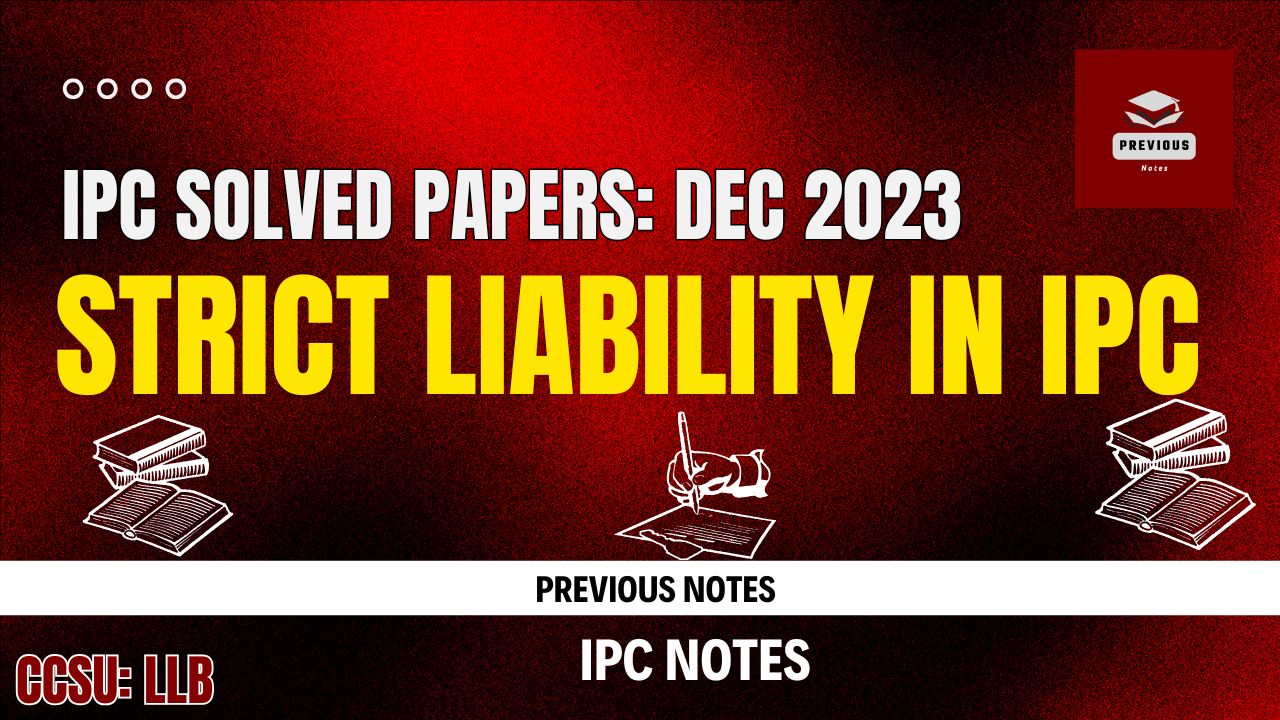Strict liability in IPC
Strict liability is a legal principle where a person is held accountable for certain offenses irrespective of intent (mens rea) or negligence. Liability arises purely from the commission of the act (actus reus) that causes harm, without the need to establish a guilty mind.
Essential Elements of Crime under Strict Liability
- Human Body: The act must involve a person or their property.
- Actus Reus: The physical act or omission causing harm (e.g., polluting the air).
- Injury: As per Section 44 of IPC, injury refers to harm caused to a person’s body, mind, reputation, or property.
- Mens Rea Irrelevant: Unlike general crimes, mens rea (guilty mind) is not necessary under strict liability.
Examples of Strict Liability Offenses in IPC
- Section 268: Public nuisance.
- Section 278: Making the atmosphere harmful to health.
- Section 290: Punishment for public nuisance.
- Section 304A: Causing death by negligence.
These provisions hold individuals liable for harm caused by their actions, regardless of intent or negligence.
Defenses Available under Strict Liability
- Act of God (Vis Major): Harm caused by unforeseeable natural events (e.g., floods, earthquakes).
- Plaintiff’s Fault: If the harm occurred due to the plaintiff’s own negligence or actions.
- Consent of the Plaintiff (Volenti non fit injuria): When the plaintiff voluntarily accepted the risk.
- Third-Party Act: If the harm was caused by an independent third party’s actions.
- Statutory Authority: If the act causing harm was authorized by law.
These defenses are rooted in principles established in Rylands v. Fletcher, a landmark case in strict liability.
Strict Liability vs. Joint Liability
Strict Liability
- Liability arises solely from committing the act.
- Mens rea (mental intent) is not required.
- Focus on protecting public interest.
Joint Liability
- Involves two or more individuals acting together in the commission of a crime.
- Both actus reus and mens rea are distributed or combined between the parties.
- Covered under IPC sections like abetment, conspiracy, and common intention.
Example of Joint Liability:
- A abets B to murder C.
- A has mens rea (intent to kill), but no actus reus (physical act).
- B has actus reus (commits the murder), but no mens rea.
- Both A and B are jointly liable under IPC.
Key Difference:
- Strict Liability ignores intent and focuses on action.
- Joint Liability combines shared responsibility for actions and intent.
You May Also LIke:
You May Also Like:
Crimes without Mens Rea? Statute without Mens Rea.
IMPOSSIBLE ATTEMPT | ATTEMPT VS IMPOSSIBLE ATTEMPT
Mistake of Fact Vs. Mistake of Law | Sec. 76 of IPC
Movable Property in IPC: IPC Section 22
Nature, Scope, Importance of Jurisprudence
Definition of Jurisprudence by various jurists
Relationship between Law and Morals
Difference between Austin and Kelson
Realist Movement of Jurisprudence
Jurisprudence is lawyers’ extraversion
Short note on ‘Manu’ : Jurisprudence
Short Note on Jeremy Bentham: Jurisprudence
Short note on ‘Sir John Salmond’ Jurisprudence
Euthanasia in India, Right to die with Dignity
Right to Privacy Case Law Mr. X vs. Hospital Z
Federal Constitution Definition and key points
University of Madras vs. Shantabai,1954: Article 12 Case Law
Article 20 Fundamental Right with Case Laws
Article 19 Fundamental Right of Indian Constitution with 10 Case Laws
Article 358, 359 Fundamental rights during emergency
Parliamentary Privileges and Fundamental Rights with Case Laws
Article 14 Fundamental Right with Case Laws
Article 15 Fundamental Right with Case Laws
Article 12 Fundamental Right with Case Laws
DOMESTIC VIOLENCE AS TORT | APPLICATION OF TORT LAW
Crimes without Mens Rea? Statute without Mens Rea.
Definition of crime by various jurists, Criminology
Methods of Studying Criminology
All about Capital Punishment with Case Laws
IMPOSSIBLE ATTEMPT | ATTEMPT VS IMPOSSIBLE ATTEMPT
Difference between Preparation and Attempt
Tests to Determine Attempt and preparation | With Case Laws
Difference between intention and motive | In Tabular Format
Forms of Judicial Process: Adversarial & Inquisitorial
Indian Penal Code MCQs Quiz: Section 1 to 5
Indian Panel Code MCQs Quiz on Section 511 and Attempt
IPC MCQs Quiz on Sec. 76 and Sec. 79 | Quiz on Mistake
Practice IPC MCQs online for free (Section 78)
Practice IPC MCQs Quiz for free | Section 81 MCQs | Necessity
Practice IPC MCQs online for free : Infancy (section 82-83)
Practice IPC MCQs Quiz for free | Section 81 MCQs | Necessity
Practice IPC MCQs Quiz for free | Section 84 MCQs | Insanity
Practice IPC MCQs Quiz for free | IPC Section 85 MCQs | Intoxication
Difference between tort and crime | Previous Notes
DOMESTIC VIOLENCE AS TORT | APPLICATION OF TORT LAW
Economic Tort | Business Tort: Application of Tort Law
Difference between intention and motive | In Tabular Format
Bolam Test | Bolam V. Friern Hospital Committee | Medical Negligence
Jacob Mathew V. State of Punjab Case Law | Medical Negligence
Medical Negligence in tort | Case Laws
Contributory Negligence | Law of Tort | Case Laws
Essential conditions of liability for negligence | Negligence in torts
Specific Principles of Criminal Law | LLM Previous Year Paper 2024 | CCSU
Specific Torts | LLM 4th Semester Previous Year Paper 2024 | CCSU
History and Basic Principles of Criminal Law | Previous Paper 2023
LLM Previous Year Paper 2023 | PRIVILEGED CLASS DEVIANCE
PENOLOGY PREVIOUS YEAR PAPER | LLM | CCSU
LL.M Previous Year Paper 2023: Legal Education & Research Methodology
LL.M Previous Year Paper 2023: Jurisprudence-I Download Now!
LL.M Previous Year Paper 2023: Indian Constitution! Download Now!
LLB Previous Year Paper 2023 | Constitutional Law II | CCSU
LLB Previous Year Paper 2023 | Legal and Constitutional History | CCSU
LLB Previous Year Paper 2023 | Jurisprudence II | CCSU

Leave a Reply Cancel reply